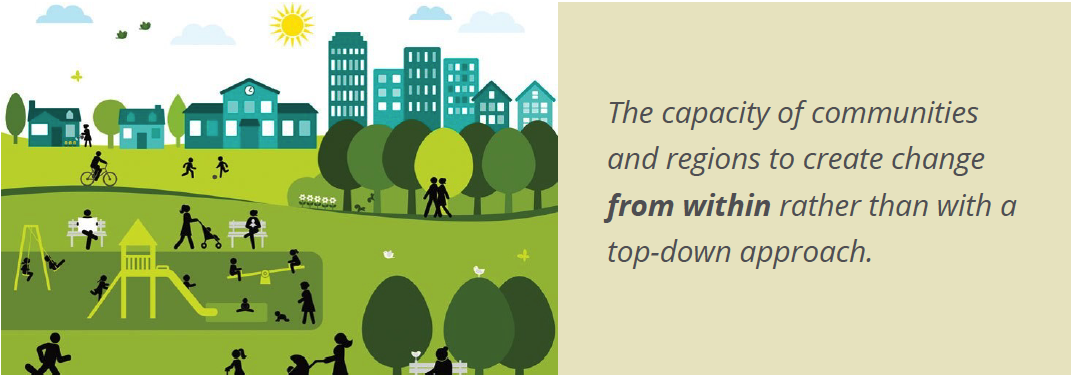Civic Capacity Index
Assessing Community-Driven Change
The Civic Capacity Index is a diagnostic tool for communities to determine how well they can work together to make decisions, solve problems and adapt in a crisis.

Assessing Community-Driven Change
The Civic Capacity Index assesses a community’s capacity for community-driven change.
The index measures a community’s ability to collectively respond and make progress on shared and complex social challenges in cooperative, equitable, and democratic ways. The Civic Capacity Index helps inform, share, and evaluate local community development and intervention strategies such as civic leadership training programs, needs assessment, capacity building initiatives, policy development, problem-solving, and technical assistance. The Civic Capacity Index is designed to assess and help transform civic culture.
What is Community-Driven Change?

Community-Driven Change and the Civic Capacity Index
Paradigm Shift in Community Development
Over the past two decades, there has been a distinct shift in thinking regarding where the impetus for adaptation and change should come from in neighborhoods, communities, and regions. Perhaps recognizing the limitations of top-down, externally driven approaches, foundations, government agencies, and other socially-oriented institutions now aspire to encourage and support community-driven responses to adaptive challenges such as public health, education, housing, policing, and other public crises that require the community to adapt or to be resilient.
Three premises inform this thinking about community-driven change:
- It is more effective in making lasting progress because a broad range of stakeholders are involved, from defining the problem to taking action to address it.
- It is more inclusive and egalitarian, therefore more democratic.
- Communities with the capacity for community-driven change are observably more resilient and better equipped to respond collectively as complex challenges arise.
At its core, then, community-driven change might be defined in terms of shared power between decision-makers and community members, multiple perspectives on issues, strong participation from diverse people, a focus on the common good, and decision-making processes that are equitable, authentic, and transparent.
Why Assess Community-Driven Change?
The Civic Capacity Index (CCI) is a diagnostic tool that was created in partnership by a national panel of community members, practitioners and leadership experts using a concept mapping process. Experts identified what is needed in communities for community-driven change.
While community-driven change has become the preferred mechanism that decision-makers call for to guide collective innovation, there is no broadly accepted definition of what constitutes community-driven change, nor is there a standard for what it looks like in practice. This index provides communities with a diagnostic tool to:
- Assess their collective capacity to respond to current and future challenges;
- Identify a starting place for building community’s capacity to learn, plan and act together;
- Create a deeper understanding of why some communities respond more effectively to challenges than others;
- Provide a common measure for assessing the impact of community development interventions
- Strengthen community’s ability to be resilient during a crisis;
- Inform policymakers about key mechanisms of community-driven change to leverage resources for long-term progress in collective action.
Civic Capacity and Its Importance During a Crisis like a Pandemic
As the coronavirus continues to devastate communities across the nation, planning for the aftermath is beginning to take center stage. As horrendous as the initial shock has been, it is but the first of many cascading impacts that must be addressed. Economic decline (collapse, in some places), increases in inequality in health and wealth, inadequate capacity of institutions to respond, failing health and education systems, and so on, will follow, rending the social fabric of families, communities, states, and the nation. Trillions of dollars will be allocated and spent by federal, state, and local government agencies and foundations to address these challenges. Some communities will be able to put these resources to good use. Others will become more dependent on outside entities (like governments and foundations) for their survival and less resilient in the face of future challenges. The longer-term response to the effects of this pandemic will be as important as the initial response to its manifesting symptoms.
Given the immensity of the damage and the colossal investment needed to repair it, ensuring that subsequent responses enhance the capacity – the resilience – of communities and regions to respond to future challenges and disruptions becomes imperative. An emerging definition of community resilience goes beyond merely coping with an external shock like the coronavirus and returning to the status quo ante. Radical theories see resilience as a dynamic process, not of bouncing back, but of reinvention and transformation. A systemic response is more powerful than a symptomatic one.
This is adaptive work that involves power, politics, radical inclusion, authentic engagement, and mutual learning. Civic capacity brings these elements together to make progress. Those who study how communities work to know why some respond better than others to disruptions like the coronavirus: they are more resilient because they have greater civic capacity. This disaster offers an opportunity to enhance the civic capacity of this country’s communities and regions reclaiming the civic life that has made our country strong for decades.
Civic Capacity Index Currently Being Used in Colorado
The Civic Capacity Index is currently being piloted in rural and urban communities in Colorado. The civic capacity index assesses 6 dimensions of civic capacity. These dimensions include:
- Leadership
- Inclusion
- Institutions
- Civic Culture
- Coalitions
- Collaboration
Learn more. Contact CCI program leads to get started.
For questions about administration and interpretation of the CCI, contact David MacPhee, CSU Dept of Human Development & Family Studies.
For all other information, contact Patti Schmitt, CSU Office of Engagement and Extension Community Development Director.
Thank you to everyone who made this project possible. The CCI is the result of collaboration between many individuals and institutions including David Chrislip of Skillful Means, dedicated teams of researchers and academics, communities around the state of Colorado, and more.



The Civic Capacity Index is supported by


